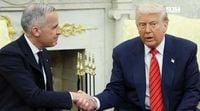Former President Donald Trump has stirred controversy by suggesting that FIFA, the governing body of international football, should consider allowing Russia to participate in the 2026 World Cup. This event is set to be co-hosted by the United States, Canada, and Mexico. During a recent meeting with FIFA President Gianni Infantino, Trump learned that Russia was banned from the upcoming tournament.
Trump expressed optimism that the inclusion of Russia could serve as a catalyst for peace in the ongoing Ukraine conflict. "Yes, they are banned from competing temporarily, but we hope something happens and peace occurs so that Russia can compete again," Infantino informed Trump. In response, Trump remarked, "That could be a good incentive. We want him to really stop. Nowadays, over 5,000 people are dying every week. It’s incredible." This statement highlights Trump's concern regarding the humanitarian crisis stemming from the war.
Meanwhile, U.S. Vice President J.D. Vance emphasized the nation's desire to welcome fans from around the globe for the World Cup. "We welcome them. We want to celebrate and have many people come to watch the games. But when the games are over, we hope they return to their countries," he stated, underscoring a commitment to international camaraderie amid complex geopolitical tensions.
In a separate but equally significant meeting, Trump met with Canadian Minister Marc Garneau to discuss a range of cooperative measures between the two North American countries. This meeting marked a pivotal moment in U.S.-Canada relations, particularly regarding border security, energy policy, and green finance.
One of the primary topics of discussion was border security, where Trump reiterated his goal of reducing illegal immigration. He proposed that Canada join the "Safe Third Country" agreement, a system currently in place with Mexico and Central American nations that aims to manage the flow of asylum seekers. Trump urged Garneau to support stricter measures for returning refugees to Canada, aiming to alleviate the burden on the United States.
On the energy front, Garneau advocated for the revival of the Keystone XL pipeline project, emphasizing Canada's potential as a stable energy supplier to the U.S. He highlighted that Canada possesses significant clean energy resources, including rare minerals and renewable energy options, which could help reduce reliance on Middle Eastern oil.
However, Trump maintained a firm stance on fossil fuels, endorsing domestic production of oil, gas, and coal. He questioned the economic viability of transitioning to clean energy on a large scale, reflecting a broader skepticism about the pace of environmental reforms.
The discussions also touched on the topic of green finance, where Garneau proposed establishing a joint green finance market and expanding investment mechanisms for clean technologies. Trump, however, appeared cautious, suggesting that economic growth should focus on traditional energy sectors rather than prioritizing environmental, social, and governance (ESG) standards as Garneau had hoped.
Although no concrete agreements emerged from this meeting, the dialogue between the two leaders signals a willingness to engage in discussions that could reshape the future of U.S.-Canada relations. The world currently faces pressures from economic challenges, geopolitical tensions, and climate crises, making these discussions particularly timely.
As the two nations navigate their differing perspectives, the meeting serves as a reminder that collaboration is essential in addressing shared challenges. The outcomes of these discussions may not only influence bilateral relations but also reflect the evolving roles of both countries on the global stage.
In summary, Trump's recommendations regarding Russia's World Cup participation and his discussions with Garneau highlight the complexities of international diplomacy today. With the ongoing war in Ukraine and pressing environmental issues, the path forward requires careful negotiation and a commitment to mutual cooperation.




